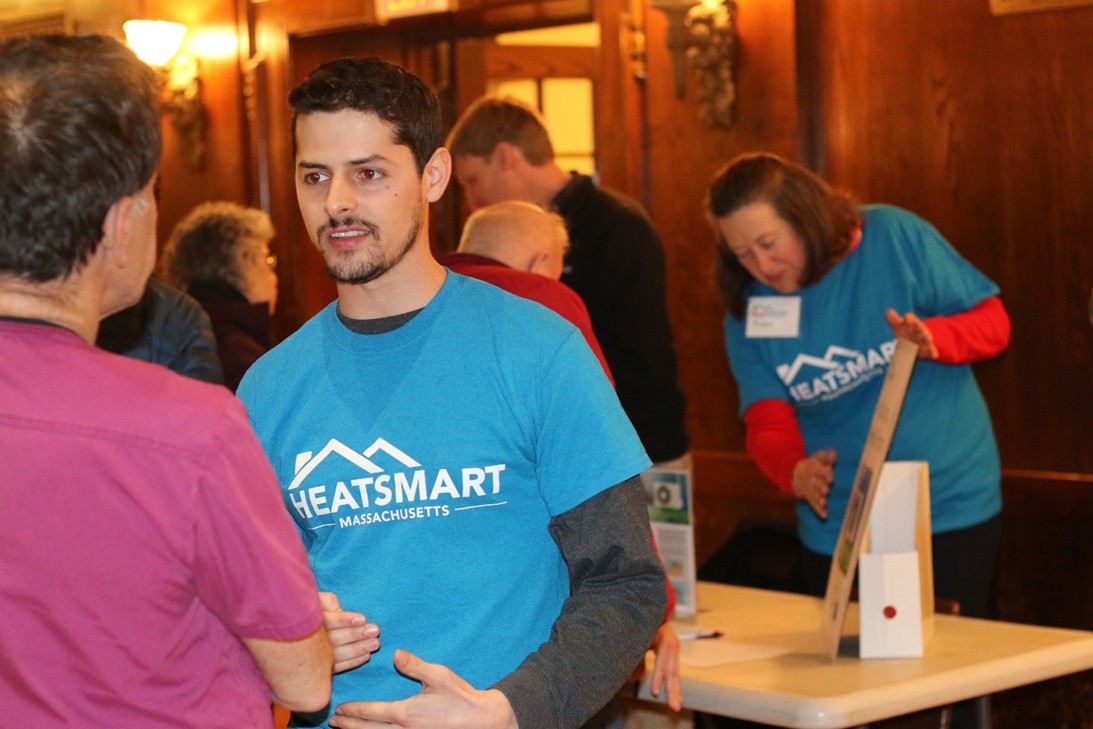

By Andrew Winslow | Fri, November 7, 25
One-on-one energy coaching is an increasingly popular, low-cost way for municipalities to support community members with resources on purchasing a heat pump or heat pump water heater and finding a qualified contractor. Heat pumps have numerous benefits, including lower energy usage and utility bills for many households, improved resident comfort, and indoor air quality.
Recent advancements in home heating and cooling have introduced complexity that can be overwhelming for many homeowners. Those looking to update their heating and cooling systems may find themselves inundated with unfamiliar terms. Moreover, misinformation can leave homeowners feeling overwhelmed and skeptical about the process. Enter the energy coach! This blog post provides an overview of energy coach programs and gives you a sneak peek at new resources coming out soon from NEEP.
What is an Energy Coach?
An energy coach is a community member, often a volunteer, who works one-on-one with homeowners to provide free education and guidance on complex energy upgrades. Energy coaches help reduce the complexity of purchasing a heat pump or heat pump water heater by talking through priorities, system design, finances, installer communication, and more. The coach acts as a third-party resource, creating a welcoming environment for clients to ask questions and learn before they approach installers.
While coaches can work independently, they are most effective when operating as part of a program. These programs often include an educational website and one-on-one coaching services, becoming a trusted hub for attracting clients and promoting events. Coaches participating in the program benefit from streamlined tools, shared resources, and peer support. In Massachusetts, 14 municipalities have energy coaching programs to help meet their clean energy goals. The HeatSmart Alliance, a Massachusetts nonprofit, acts as an energy coaching hub, providing coaching services to towns without their own programs. Energy coaching is also gaining traction beyond Massachusetts, including Maine, New Hampshire, Connecticut, New York, and Colorado.
Helping Municipalities Launch Energy Coach Programs
Despite the abundance of activity in energy coaching over the past several years, getting a program off the ground is still challenging for municipalities. The workload and internal processes are unfamiliar, and legal considerations are not well understood, which can make senior leadership hesitant to proceed. To fill these gaps, NEEP is developing an Energy Coaching Program Toolkit designed to support communities across the region interested in launching municipals energy coaching programs. To ensure that diverse perspectives informed the development of the Toolkit, NEEP convened a cohort of Massachusetts municipalities including both newcomers to coaching and those with established programs. The Toolkit, which will be launched soon, will have three main sections:
Program Description
The Toolkit will provide an overview of coaching programs and what makes them successful. It defines roles that should be filled for an effective program: program manager, coach, outreach coordinator, coach coordinator, and IT coordinator. Conversations with existing programs highlighted the importance of involving at least one municipal staff member, which gives the program credibility and improves long-term success. The program description also includes a client journey diagram that highlights key actions and tools needed at each stage of the client journey. The guide also shares lessons learned from existing programs to provide clarity to risk-averse municipalities and offers strategies and solutions and offers guidance and best practices for training coaches effectively.
Model Website/Webpage
Creating a website can be challenging. NEEP developed an example sitemap complete with copy and paste ready language for a Homepage, Learn More pages, and an FAQ. For programs that cannot create a dedicated website with multiple pages, we also include a streamlined single webpage version. Inspiration for the website/webpage layout came from an in-depth comparative analysis of existing programs.
Communication Guide
To be successful, energy coaching programs need to think beyond coaching consultations and ensure they are visible in the community. Public events like open houses, education sessions, and tabling at public activities are all opportunities for programs to connect with potential clients. The Toolkit’s communication guide includes a seven step, annotated Outreach Strategy Template to help an organizer plan effective outreach. This resource includes information and guidance on setting goals, tracking metrics, and communicating to diverse audiences with differing priorities. The guide also has lists of local stakeholders that can be engaged, various outreach channels where messages can be displayed, and activities to attract or educate the community.
Stay tuned for more!
While community energy coaches are not blowing whistles and running up and down the court, they are looking out for their neighbors and strategizing how to best meet their heating and cooling needs and priorities. We plan to publish these resources soon. For any questions or to learn more, send an email to Andy.


